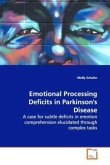Examination of how the brain mediates emotional experience is now an area of intense research interest. This is an important endeavour considering that emotion is a key component in vulnerability factors governing risk for mood and anxiety disorders. Recent studies have also explored the effects of antidepressants on the processing of emotional stimuli in healthy participants to help understand the role of neurochemicals in affective behaviour. Unfortunately the literature is fraught with contradictions and complications resulting from the technique used, task instructions, selection of stimuli and gender differences. Our aim therefore, was to investigate emotional processing in healthy participants and to examine the impact of serotonergic augmentation on this processing through the presentation of visual emotional stimuli and examination of self report, peripheral and neurophysiological measures of emotional responsiveness. Findings provide evidence for modulation of these measures by emotional content, gender and serotonin and may lead to greater understanding of the functional consequences of neurochemical modulation on cortical networks involved in emotional processing.
Bitte wählen Sie Ihr Anliegen aus.
Rechnungen
Retourenschein anfordern
Bestellstatus
Storno








